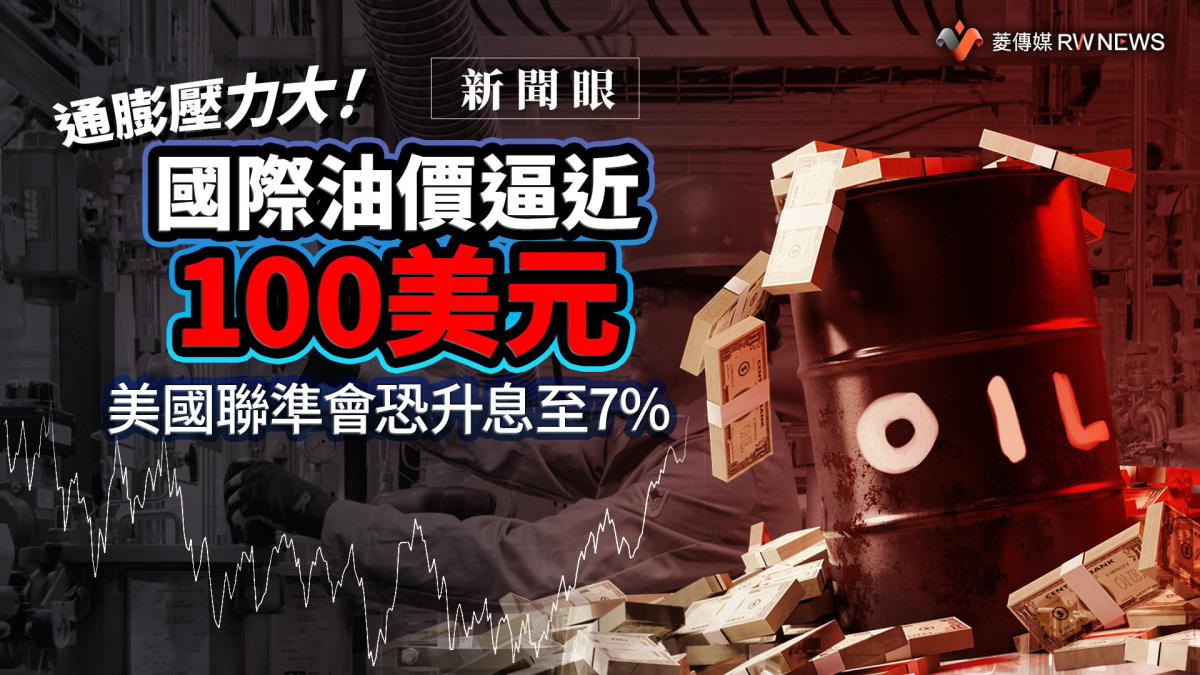News Eye/Inflation pressure is high! International oil prices approach US$100, US Federal Reserve may raise interest rates to 7%
(Reporter Wang Qiuyan/Comprehensive Report) With Saudi Arabia, Russia and other oil-producing countries continuing to reduce production, the market is highly expecting that international oil prices will exceed US$100 per barrel sooner or later, deepening the haze of rising inflationary pressure again, and also undermining the U.S. Federal Reserve and others Central banks quickly suspended expectations for interest rate hikes.
According to the New York Times, Saudi Arabia began to reduce production last year and kept its average daily output at about 9 million barrels, about 2 million barrels less than a year ago. Saudi Arabia and Russia are both members of OPEC (Organization of the Petroleum Exporting Countries). OPEC countries are withholding more than 5 million barrels of crude oil per day, equivalent to 5% of global supply.
Saudi Arabia, Russia cut production until at least the end of the year
The United States and Europe imposed severe economic sanctions on Russia because of Russia’s invasion of Ukraine. They thought they could prevent Russia from controlling the oil market. However, an analysis of shipping and insurance record reports by the Financial Times found that Russia continues to carry oil to oil-buying countries through tankers known as the “Dark Fleet” without the services of the Western insurance industry, and is getting better and better at it. circumventing Western sanctions.
Russia has not only reduced oil output with other OPEC members, but also recently announced a ban on diesel exports. Russia is one of the world’s largest diesel sellers. As winter approaches, the relevant ban will have a great impact on the supply and demand of the global energy market.
“Nikkei Asia” reported that Saudi Arabia and Russia’s production cuts will continue at least until the end of the year. As market supply tightens, Russia will be able to further reduce oil purchase discounts to buyers from various countries, including India, China and some Southeast Asian countries. .
Gary Ross, CEO of energy trader Black Gold Investors, said oil-producing countries such as Saudi Arabia and Russia are starving the market and are using reduced supply to push oil prices to the levels they want.
Since July, the price of British Brent crude oil futures has risen by 30%. On September 27, the price once reached US$96.5 per barrel. Market analysts believe that it is only a matter of time before it breaks through US$100.
Increased oil revenue will help Russia continue to attack Ukraine
UBS predicts that Brent crude oil futures prices will consolidate between US$90 and US$100 per barrel in the next few months; Goldman Sachs predicts that Brent crude oil futures prices will consolidate between US$80 and US$105 per barrel.
The Kyiv School of Economics (KSE) estimates that oil is Russia’s largest source of income. As crude oil prices continue to rise, Russia’s oil revenue may increase to US$15 billion this year, from which Russia will be able to obtain funds for its continued attack on Ukraine.
Giovanni Staunovo, a commodity analyst at UBS, warned that rising oil prices are not good news for Asian countries, because Asian countries mostly rely on imported oil and other energy products, and inflationary pressure will increase accordingly.
However, Cyn Young Park, Director of the Regional Cooperation, Integration and Trade Department of the Asian Development Bank, pointed out in an interview with Nikkei Asia, “As long as high oil prices do not persist for too long, the economic harm to Asian countries will not be too great.
Morgan Stanley: The world is not ready for US interest rates to rise to 7%
Cyn Young Park analyzed that India and China were able to purchase crude oil from Russia at a significant discount before. Now that crude oil supply has decreased, oil prices have increased, and China’s economic recovery has slowed down, “the two countries will slow down the pace of building strategic crude oil inventories. And this force supporting oil prices will naturally weaken.” He also warned that high oil prices have deepened countries’ concerns about high inflation pressure, and countries will continue to raise interest rates to suppress inflation, which will have a negative impact on people’s willingness to consume and financial markets.
The U.S. Federal Reserve (Fed) suspended interest rate hikes at its September meeting and maintained the benchmark interest rate at a range of 5.25-5.5%, still warning that U.S. inflation remains at a high level. However, most markets expect that after the Fed raises interest rates once more before the end of the year, it will suspend interest rate increases.
Jamie Dimon, chairman of JPMorgan Chase, stands out from the crowd and predicts that the Federal Reserve will not only not suspend interest rate hikes next year, but will also raise them all the way to 7%. When he attended the JP Morgan Investor Summit in India a few days ago, he warned that the world had never expected the consequences of 7% U.S. interest rates, and called on everyone to be prepared, and the United States may face stagnant inflation.
Ling Media original website:News Eye/Inflation pressure is high! International oil prices approach US$100, US Federal Reserve may raise interest rates to 7%
2023-10-08 16:00:00
#News #EyeInflation #pressure #high #International #oil #prices #approach #US100 #Federal #Reserve #raise #interest #rates
